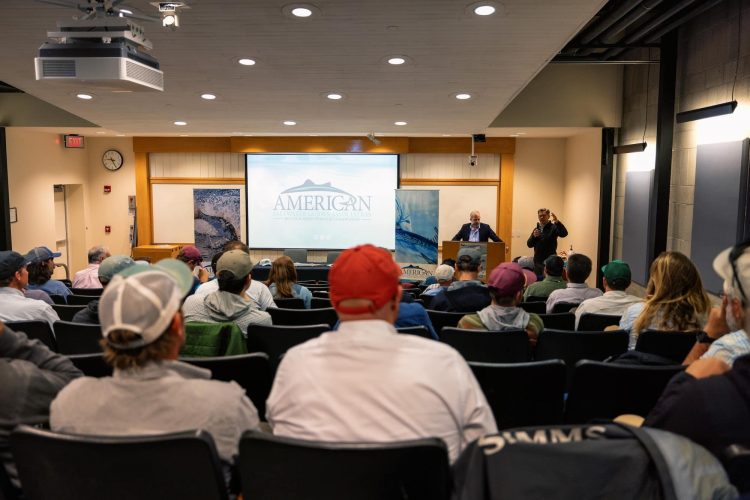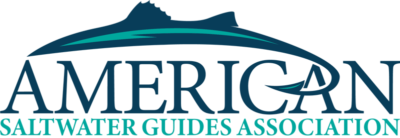New England Science Symposium
SRING 2024
Fisheries Science Symposium
CAPE COD, MASSACHUSETTS
ASGA FISHERIES SCIENCE SYMPOSIUM
In May 2024, ASGA hosted our second Fisheries Science Symposium with the goal of further unifying the angling community, fostering productive discussion and inspiring stewardship across sectors.
ASGA Science Symposiums foster a collaborative learning environment for industry leaders, including guides, brands, small business owners, media, scientists and state representatives. The Spring 2024 event was a huge success. You can access a full library of presentation coverage on the ASGA youtube by scrolling below:

Spring '24 Presentation Library:
Resident Striped Bass Research
The presentation focuses on striped bass research, which evolved from a project centered on river herring, another crucial species in the ecosystem and indigenous culture of Martha’s Vineyard. River herring are key prey species that spawn in freshwater while living their adult life in the ocean. Historically, Martha’s Vineyard was abundant in river herring, but current numbers represent only a small fraction of their past abundance. The tribe of Aquinnah Wampanoag on Martha’s Vineyard, which has depended on river herring for sustenance and cultural practices for centuries, has seen a decline in their natural resources. To address this, the tribe initiated a monitoring program to gather data and support restoration efforts. The research covers areas like population dynamics, habitat availability, water quality, and predator-prey relationships, with a focus on preserving the ecosystem.
Shifting Mindsets - Louisiana Redfish
A Louisiana resident and experienced fishing guide, Captain Bailey Short shares his journey to fighting for Louisiana’s declining redfish population. Capt. Short and fellow Louisiana guides have been aware of the severe drop in redfish numbers, witnessing the decline on the water firsthand, and realized the state lacked a unified conservation voice that was resource-forward. Despite historical resistance to change and a culture focused on harvesting limits, Bailey and others pushed for regulatory reform to reduce recreational harvest limits. Their efforts, supported by anglers and brands around the nation, led to the first reduction in harvest limits in over 35 years. Bailey highlights the economic and ecological importance of the fishery, noting that it attracts international visitors and generates substantial local revenue. His ongoing advocacy includes educating local anglers and partnering with organizations to gather data for better conservation strategies.
Artificial Intelligence & Fisheries Data
Luyen Chou, an avid fisherman and entrepreneur with a background in artificial intelligence and online learning, shares insights about the development of his app, GotOne. Luyen details his transition from being a tech executive to creating a data-driven fishing log application aimed at improving saltwater fishing experiences. Initially driven by personal frustration with traditional fishing logs and a desire to harness technology for better data collection, he developed GotOne to simplify the recording of fishing catches through features like photo metadata and voice commands. The app captures a variety of environmental data, such as tide, moon phase, and water conditions, to assist both anglers and fisheries scientists. He highlighted the app’s success, driven by partnerships with organizations and its adoption by a passionate user base, emphasizing its potential to contribute valuable data to fisheries management while maintaining user privacy.
Albie Project - Research Update 2024
Scientists from The New England Aquarium provide an update on the ASGA coastwide albie tagging study, marking a significant development in understanding of their movement patterns. The study used acoustic tagging methods to track albies after release, revealing that they can travel thousands of miles in weeks, from Massachusetts all the way to Key West. The study highlights the popularity of false albacore fishing due to the fish’s challenging nature and emphasizes their economic value to coastal communities. Efforts to tag and track false albacore involved both internal and external tagging techniques, using acoustic telemetry to monitor their movements and post-release survival. The research has shown that albies utilize a wide range of Nantucket Sound in a singular day. Data sharing networks like the Atlantic Cooperative Telemetry Network help track these movements along the coast, providing valuable insights for future management and conservation efforts.
Albie Management in North Carolina
Chris Batsavage from the North Carolina Division of Marine Fisheries discusses the status and management of false albacore fisheries in North Carolina. He provides an overview of the fishery’s current state, highlighting an increase in recreational releases, as well as commercial landings over recent years. Savage details the history of management, noting that false albacore was previously included in a broader management plan but lacked specific measures. He outlines a proposed rule from February 2024, which allows for regulations if landings exceed a set threshold, aiming to balance growth with management. The proposed rule includes limits on trip and vessel catches but excludes size limits or gear restrictions. Savage emphasizes the need for management due to the fishery’s growth and the lack of coast-wide management.
Climate Ready Fisheries
ASGA’s Will Poston addresses the challenges climate change poses to fisheries management, particularly the shifting distribution, angling opportunities and abundance. While fish stocks are changing rapidly, management and scientific approaches are struggling to keep pace. Key concerns include the lack of climate change considerations in current fishery management plans, and the need for better data and adaptive strategies to maintain sustainable fisheries. National initiatives, such as funding from the Inflation Reduction Act and NOAA’s ecosystem-based fisheries management (EBFM), are highlighted as potential solutions for gathering more accurate climate data and improving management practices. Will emphasizes the importance of holding NOAA accountable for implementing these policies to ensure long-term sustainability and resilience of fish stocks.
Dynamic Ecosystems - Forage Fish
The presentation discusses challenges related to forage fish in New England, focusing on their importance for maintaining healthy fisheries. Species like mackerel and herring are overfished and struggling to recover despite efforts. The discussion highlights the need for better scientific understanding and management, especially in the Chesapeake Bay for menhaden, where precautionary measures are recommended. The video also touches on Amendment 10, which looks at spatial management for the Atlantic herring fishery, aiming to reduce conflicts between user groups (e.g., commercial and recreational). Concerns include the impact of midwater trawling, an efficient but harmful fishing method, on the ecosystem. The amendment explores ways to protect critical habitats, such as spawning areas, and calls for more informed, precautionary management strategies. Additionally, new genetic research shows the incidental catch of river herring in specific areas, which could help refine fishing regulations.
False Albacore Fisheries Discussion
David Borden discusses the challenges of managing data-poor fisheries, particularly albacore, and emphasizes the lack of both biological and economic information needed for effective management. He stresses the economic importance of the albacore fishery, noting that the value generated by recreational fishing has not been fully calculated. Using the example of the Jonah crab fishery, he illustrates how market changes can rapidly shift fishing pressures and the need for precautionary management. The speaker advocates for a collaborative approach among states, involving stakeholders like fishermen, environmentalists, and economists, to establish baseline regulations that protect the fishery’s sustainability. He suggests that forming working groups and conducting economic studies would provide the necessary data to support better management strategies, potentially leading to coast-wide regulation. The presentation concludes with an invitation for collaboration and continued engagement with the fishing community.
BETTER BUSINESS THROUGH COMMUNITY
A special thank you to the entire SIMMS Fishing team for their continued commitment to our false albacore fishery. SIMMS’ love for our saltwater fishing community hasn’t wavered, from supporting guides that make their living with these fish to sponsoring research, tournaments and community events that fight to conserve them. SIMMS was the presenting sponsor for the 2024 ASGA Fisheries Science Symposium on Cape Cod.
If you want to learn more about the Symposium and attend future ASGA events, we encourage you to become a member. If you are business owner or brand representative interested in involvement with future events, please email:
